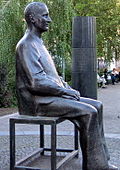- The Days of the Commune
-
The Days of the Commune is a play by the twentieth-century German dramatist Bertolt Brecht. It dramatises the rise and fall of the Paris Commune in 1871. The play is an adaptation of the 1937 play The Defeat by the Norwegian poet and dramatist Nordahl Grieg.[1] Brecht's collaborator Margarete Steffin translated the play into German in 1938 and Brecht began working on his adaptation in 1947. The process was driven by another Brecht collaborator, Ruth Berlau, who had introduced Brecht to Grieg in 1931.
The work forgoes the individual dramatic hero and focuses on the Paris Commune itself, a collective composite of people. The scenes shift between the different lives of people, going from the street corners of Montmartre to the Paris City Council. On this council, the enemies of the Commune, Thiers and Bismarck, engineer the collapse of the Commune.
The play details an event that is considered to be the original proletarian revolution and a major event in the socialist revolution. Marx viewed the fall of the Commune as the coming into being of a classless communist society. Brecht's play develops a Leninist interpretation of the Commune.
Notes
- ^ When the Nazis had invaded Norway in 1940 Grieg escaped to Britain, and served in his country's government in exile. He also served as a war correspondent and observer for operational missions for the RAF, and died in 1943 after being shot down during a raid on Berlin.
Sources
- Calabro, Tony, Bertolt Brecht and the Art of Dissemblance, Longwood Academic, 1990

This article on a play from the 1940s is a stub. You can help Wikipedia by expanding it.

